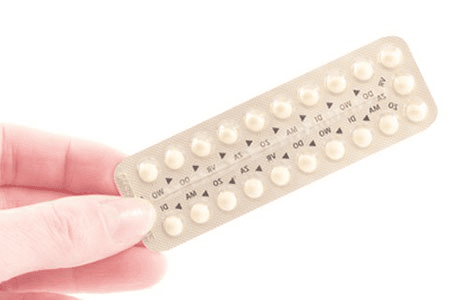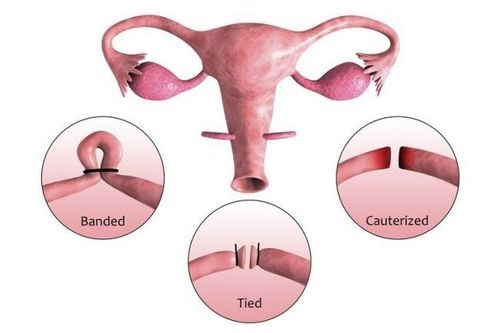This is an automatically translated article.
The article is professionally consulted by Doctor Department of Obstetrics and Gynecology, Vinmec Hai Phong International General Hospital.
The combined oral contraceptive pill is an oral contraceptive containing two female sex hormones, estrogen and progestin. The mechanism of action of the drug is to help prevent ovulation, change the lining of the uterus and create mucus that prevents sperm from entering.
1. Indications for the use of combined oral contraceptives
Besides being known as a very effective method of birth control, the combined estrogen and progestin pill is also used to:
treat acne by inhibiting natural substances that cause acne fish; Limit physical and emotional premenstrual symptoms in women; Treatment of menstrual irregularities, anemia caused by heavy periods or severe menstrual pain; Actively postpone the menstrual period; Sometimes used to treat endometriosis. However, combined oral contraceptives do not prevent the transmission of HIV/AIDS and sexually transmitted diseases (STDs).

2. Dosage of combined oral contraceptives
Depending on the manufacturer, estrogen and progestin combined oral contraceptives have different active ingredients, dosages, uses, benefits and risks. Typically, women need to take the hormonal birth control pills Estrogen and Progestin once a day, almost continuously throughout the menstrual cycle. You can refer to the following:
Blister of 21 tablets: Take 1 tablet/day, continuously for 21 days and stop for 7 days. Immediately start taking a new pack of pills; Blister of 28 tablets: Take 1 tablet per day in the order specified on the blister pack. Start a new pack immediately after finishing the previous pack. Most pills in the same 28-day combined oral contraceptive pack will have a different color to distinguish the pill with estrogen and progestin content from the placebo pills that only have folate and don't prevent pregnancy.
In addition, an important note when using combined oral contraceptives is to take them at the same time every day. The instructions on the packaging should be followed strictly for a high preventive effect.
Trắc nghiệm: Bạn đã biết cách tránh thai an toàn chưa?
Có rất nhiều biện pháp tránh thai an toàn nhưng không phải ai cũng biết được điều đó. Trả lời đúng những câu hỏi trắc nghiệm dưới đây chứng tỏ bạn có kiến thức tốt về các biện pháp ngừa thai an toàn.3. Side effects of combined oral contraceptives

During the first 3 months of using combined oral contraceptives, women often experience unwanted side effects because the body has not yet adapted, mainly:
Nausea or vomiting; Digestive disorders such as stomach cramps, bloating, diarrhea or constipation; Inflammation or swelling of the gums (gingiva); Change in taste, loss of appetite; Weight gain or loss; Dark skin, acne; Hair growth, abnormal hair; Bleeding between menstrual cycles; Changes in the amount of menstrual blood; Vaginal irritation. Some side effects may not be dangerous and will gradually subside, women need to continue taking the medicine as directed and not stop taking it on their own. Meanwhile, others warn of serious problems, requiring a doctor's opinion to decide whether to change the drug or not. Oral contraceptives can be used in combination with food or milk to avoid nausea.
4. What should I do if I forget my medication?
When taking an overdose, a woman may experience some typical symptoms such as nausea and vaginal bleeding. Conversely, if a dose is missed, it is necessary to use another method of contraception for about 7 to 9 days or until the end of the cycle, and continue to take the combined estrogen and progestin contraceptive pill as usual. often.
However, each type of birth control pill will have its own specific instructions in case one or more doses are missed. Therefore, women need to carefully read the manufacturer's instructions in the box of birth control pills that come with a doctor's advice.

5. Important Notes
5.1. Consult a doctor Before taking birth control pills, inform your doctor of the following information:
History of medical and surgical conditions; Allergy to estrogen and progestin, or any other ingredients; All medications currently in use. In conclusion, women should consult their doctor/pharmacist before deciding to take any birth control pills.
5.2. When to start taking the pill The time to start taking the combined oral contraceptive pill is different for each individual case:
Normal: Start taking the pill on the first day until the 5th day of your period, or on the first Sunday of the cycle; Women who have just given birth and are not breast-feeding: Wait until 4 weeks after giving birth, if later, use another method of contraception for the first 7 days. Breastfeeding: Using a combined oral contraceptive containing both estrogen and progestin is not recommended until your baby is able to absorb other food sources than breast milk. Abortion or miscarriage: It should be taken according to the doctor's instructions, usually starting immediately if the miscarriage is < 20 weeks, otherwise taking it on the 21st day after the miscarriage or the first day of the menstrual period.

5.3. Use another method of contraception To achieve high prevention effectiveness, women need to consider other methods of contraception in the following cases:
Within the first 7-9 days of taking combined oral contraceptives; Vomiting or diarrhea while taking the medicine; Missed dose one or more times. 5.4. Certain risks For women >35 years of age and heavy smokers (more than 15 cigarettes/day), taking combined oral contraceptives may increase the risk of:
Development of liver tumors, although not cancer but can cause internal bleeding; Breast or liver cancer (reduced 10 years after stopping the drug); Severe heart attack, stroke, or blood clot.
6. Pros and cons of using combined oral contraceptives

6.1. Advantages Reduce blood loss, anemia, dysmenorrhea and actively control the menstrual cycle; Regulate menstruation and supplement progestin for women; More comfortable intercourse; Reduce the risk of uterine, ovarian and all benign breast diseases; Treat acne, increase bone density; There is a possibility of becoming pregnant again immediately after stopping use. 6.2. Cons Many side effects involve minor bleeding and psychological problems; Amenorrhea in women with a history of irregular menstrual cycles; It can be stressful to take medication every day; Does not protect women against sexually transmitted diseases. Storage conditions for combined oral contraceptives require that they remain in an airtight container, at room temperature, and out of the reach of children. In some cases, women should consult their doctor to prepare another method of birth control to ensure maximum effectiveness and should still take a pregnancy test if their period is late. Do not smoke if you are taking the combined form of estrogen and progestin birth control pills.
Please dial HOTLINE for more information or register for an appointment HERE. Download MyVinmec app to make appointments faster and to manage your bookings easily.













